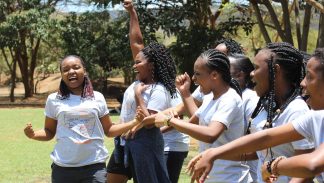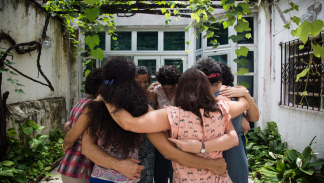Demand Justice for Berta Cáceres, and Women Human Rights Defenders Worldwide
By Musimbi Kanyoro, President and CEO, Global Fund for Women
March 9, 2016
“They follow me. They threaten to kill me, to kidnap me, they threaten my family. That is what we face.” – Berta Cáceres
Just a few days ago, we learned of the reported assassination of a courageous Honduran human rights defender, Berta Cáceres. Berta was a leading indigenous and environmental activist, who fought for over two decades to protect indigenous lands in Honduras from the threat of hydroelectric dams. Despite repeated threats, arrests, and attacks against her over many years, Berta tirelessly continued to fight for what she believed in, organizing her community to defend their land rights and even winning the prestigious 2015 Goldman Environmental Prize for her work in opposition to a hydroelectric project which threatens access to the only water source for the indigenous Lenca community. Just last week, Berta reportedly received a serious death threat, yet continued on with a press conference to loudly denounce that same hydroelectric project. She was a bold leader, activist, feminist, and mother.
I am so inspired by Berta and other resilient women around the world who passionately stand up for human rights, who stand on the front lines and defend their communities, despite the target that work puts on their backs.
Berta’s murder is a stark reminder of the situation that human rights defenders—especially women activists—face around the world. It is far too often that we hear of disturbing threats and attacks from Global Fund for Women’s network of activists, women’s rights organizations, and grantee partners—grassroots women’s groups.
This brutal violence against women human rights defenders like Berta and grassroots women’s groups that work to advance human rights comes in many different forms—violent attacks, threats, harassment, or actions that prevent activists from continuing their work. In Pakistan, an outspoken human rights activist’s address was included in a blog post imploring readers to kill her, and a month later, the activist and her husband were targeted and injured in a drive-by shooting.
Just a few weeks ago, one of the only clinics focused on the treatment and rehabilitation of survivors of violence in Egypt was issued an administrative order to shut its doors by the Ministry of Health with no details—closing their business to effectively block them from doing their work to advance human rights. In February, one of our long-time grantee’s office in Nicaragua was broken into and their computers were stolen—computers which held sensitive information about women human rights defenders, as well as women and girls they work with who had survived sexual violence, placing their security at risk. At our recent gathering of activists from Europe and Central Asia, women shared stories of the growing threats they had received, as well as the harassment and interrogation they would face when they traveled back to their home countries. One women’s group from Kyrgyzstan shared what it was like when their office was attacked with handmade explosives with the intention to set it on fire last spring.
Berta’s fate is all too similar to other high-profile women activists like bold human rights lawyer Salwa Bugaighis who was shot several times by men in hoods and military uniforms who stormed her home in Libya, just hours after casting her ballot and loudly urging others to do the same in the 2014 election.
These are just a handful of countless stories from around the world, and the data and trends also point to a bleak reality—one that we must work to change for the future. We know that threats and physical attacks against human rights defenders are particularly common in Latin America, and according to a report by Global Witness, Honduras is “the most dangerous country per capita to be an environmental activist… with 101 deaths between 2010 and 2014.”
We’ve also seen a deterioration of the situation for human rights defenders in places where conflict and political turmoil and transition escalate violence, including Syria, the Democratic Republic of Congo, Iraq, and the Caucasus. We’re also seeing growing threats against LGBTQI activists, particularly in Sub-Saharan Africa and Europe and Central Asia, where the criminalization of homosexuality in some key countries has led to increased targeting and persecution of those championing equality.
Indeed, defenders of land rights and environmental justice like Berta, as well as defenders of indigenous rights and the rights of other minority and marginalized groups, lawyers and journalists, and defenders of women’s sexual and reproductive rights—they all face unique and heightened threats and challenges.
What can we do to change this situation for women human rights defenders?
Join me in echoing the calls for an independent, transparent, and thorough investigation into Berta’s death in Honduras, and demand that governments around the world put pressure on the Honduran government to see this through. Let’s ensure that those who are responsible are held accountable for their crimes. Together, our voices are louder and harder to ignore.
Let’s continue our work to help protect women human rights defenders like Berta all over the world to put an end to the threats, harassment, violence, and senseless murders. And let’s share the stories of women human rights defenders, women like Berta who boldly raise their voices and stand on the front lines for the human rights of all of us, who dedicate and risk their lives to fight for a better, more just and equal world.
Now is a critical moment for activists in Honduras and all over the world. Let’s stand in solidarity with all of the brave human rights defenders who will continue to carry forward Berta’s legacy. As Berta did every day until her last, let us not stop until there is justice.
This piece originally appeared in The World Post.
Sign the petition: Ni una más! Justice for Berta!
Add your voice to the petition our partner, the Mesoamerican Initiative of Women Human Rights Defenders (IM-Defensoras), has launched on Change.org, demanding that the Honduran State immediately investigates this crime, and that security and protection be provided for Berta Cáceres’ family and loved ones, as well as for the other human rights defenders of Berta’s organization, COPINH.
Ni una más! Justice for Berta!


